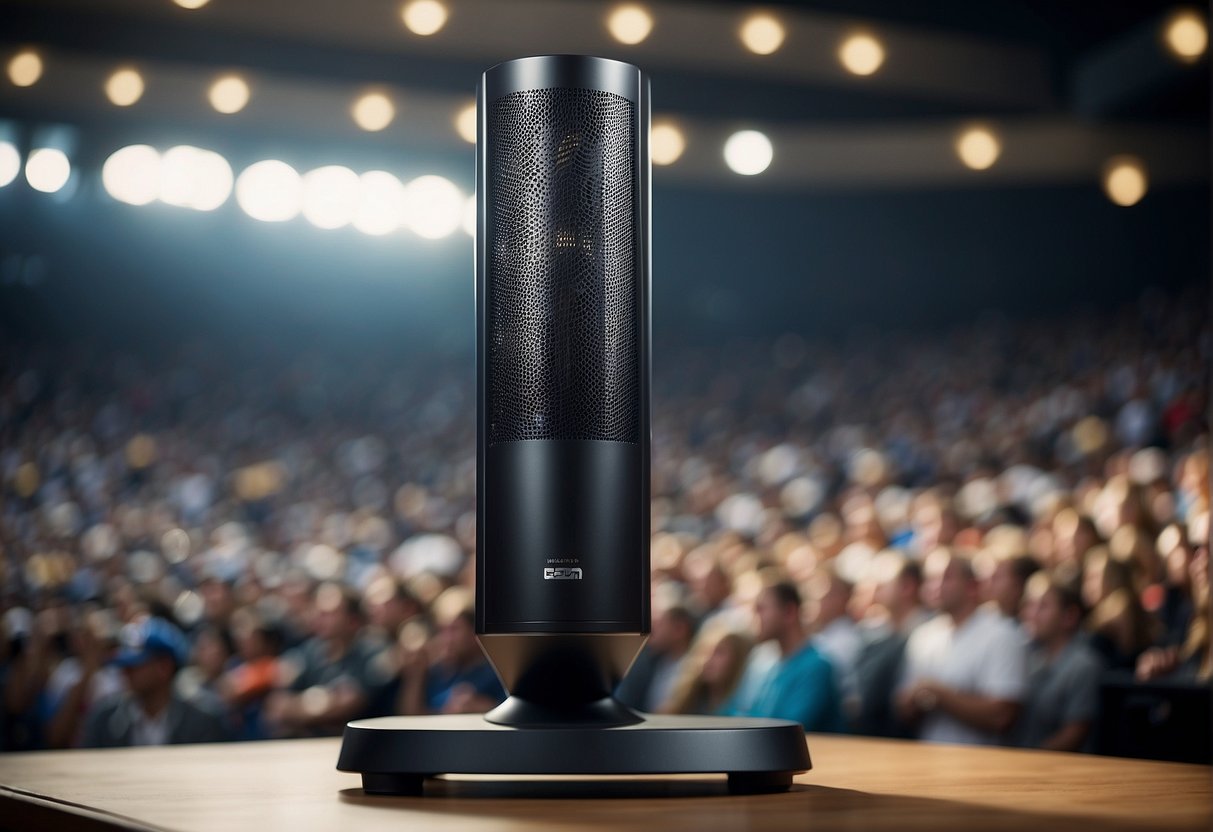Establishing Speaker Credibility in Sports

When selecting sports speakers, their credibility is paramount for ensuring they are received positively and regarded as authoritative figures by the audience. In sports, credibility is often a blend of trustworthiness, expertise, and demonstrated athletic experience.
Understanding Credibility and Authority
Credibility is the audience's perception of how trustworthy and knowledgeable a speaker is on a given subject. Authority in the context of sports is grounded in a speaker's formal standing or recognition within the sports community. This could include coaching certifications, formal education, or positions held within sports organizations. Our goal is to align these concepts to affirm the speaker's ability to engage and inspire.
Components of Trustworthiness and Expertise
To measure trustworthiness, we assess aspects such as the speaker's honesty, integrity, and character. Expertise refers to the speaker's skills and knowledge level, which includes:
- Education: Formal qualifications or training in sports.
- Experience: Past roles or contributions to the sports community.
- Accomplishments: Recognized achievements in their field.
These elements combine to shape a speaker's professional profile and influence audience trust.
Athletic Experience and Knowledge
An athlete's experience and knowledge are indispensable to their credibility. A speaker with a history of participation or achievements in sports possesses an intrinsic authenticity that resonates with an audience. We examine:
- Athletic Milestones: Awards, records, or significant career highlights.
- Practical Insight: Real-life experiences that provide valuable lessons.
We emphasize these attributes to bolster the speaker's standing as an expert, ensuring their message carries weight.
Conveying Expertise Through Content

In sports speaker selection, our credibility hinges on the strength of the content we present. We achieve this by grounding our talks in substantial insights, rigorous data, and compelling narratives.
Embracing Valuable Insights and Case Studies
Our content is enriched by valuable insights and real-world case studies. We dissect pivotal moments in sports history, detailing:
- The strategies that led to victory
- Challenges and how they were overcome
Each case study is a testament to our deep understanding of the sporting industry. By sharing these nuanced accounts, we not only demonstrate our expertise, but also equip our audience with practical knowledge.
Incorporating Research and Data
Research and data form the backbone of our credibility. We incorporate findings from:
- Academic studies
- Industry reports
- Performance analytics
Our goal is to provide an empirical foundation that reinforces the relevance of our insights. By doing so, we present ourselves as well-informed and trustworthy experts who value accuracy and detail.
Utilizing Statistics in Storytelling
Statistics are a powerful tool in our storytelling arsenal. We use them to:
| Enhance | Example |
|---|---|
| Clarity | "Player X’s batting average improved by Y%" |
| Impact | "Team A’s strategy reduced errors by Z%" |
However, we're careful to ensure that these numbers are woven seamlessly into our narrative, adding weight to our words while keeping the audience engaged and informed.
Engaging the Audience
We understand that the essence of a successful sports speaker selection lies in the ability to captivate and maintain the audience's attention. Our focus is on tailoring communication strategies to resonate with the audience’s demographics and emotions, sharing core values to establish common ground, and fostering interaction to build a strong rapport.
Understanding Audience Demographics and Emotions
In engaging an audience, we prioritize the comprehension of their demographic makeup – age, gender, cultural background, and interests. This understanding allows us to tailor our language, references, and examples in a manner that resonates deeply. Additionally, by acknowledging and addressing their emotions – whether it’s excitement, curiosity, or passion for sports – we can make our communication more impactful and memorable.
- Demographic Insight: Adjust communication style based on age range, cultural diversity, and sporting interests.
- Emotional Relevance: Incorporate stories and examples that stir the audience's emotions, aligning with their passion for sports.
Building Common Ground Through Values
To establish a strong connection with the audience, it is vital we display a set of shared values. Sports often revolve around themes like teamwork, perseverance, and fair play – principles that transcend the sports arena and appeal to a wider audience. By highlighting these common values, we bridge gaps and foster a sense of unity and understanding.
- Highlight Value-Driven Stories: Use anecdotes from sports that mirror societal values.
- Unity and Understanding: Emphasize on values that unite the audience with the speaker.
Enhancing Rapport with Interactive Communication
The cultivation of rapport goes beyond merely speaking to an audience; it involves two-way communication. We engage in interactive dialogue, invite questions, and encourage participation to make the experience more immersive. By doing so, we enhance our connection with the audience, making the event more dynamic and the message more resonant.
- Two-Way Communication: Invite audience participation through questions and discussions.
- Dynamic Experience: Use interactive tools like real-time polls or social media engagement to make the event more participatory.
Maximizing the Impact of Speech Delivery
In sports speaker selection, the successful delivery of a speech is pivotal to the credibility and influence of the message. We focus on thoroughly preparing and incorporating structured feedback to build speaker confidence and enhance their impact.
Preparation Techniques for Effective Delivery
We grasp the necessity of meticulous preparation. To start, we outline our speeches clearly, ensuring that each point logically flows into the next. This offers clarity to our audience and prevents us from veering off-topic. Additionally, we research thoroughly, which involves not only understanding the subject matter but also the audience's interests and background to personalize our message.
- Key preparation steps include:
- Crafting a clear outline
- Engaging in deep research
- Understanding the audience
Moreover, we practice transparency in our speech. Every statistic, anecdote, or piece of information must be verifiable. This builds trust and establishes our credibility, which is crucial in the sports sector.
- Transparency is achieved by:
- Using trustworthy sources
- Citing specific examples
- Being open about the limitations of our knowledge
Eye contact is another powerful technique that we employ. By maintaining eye contact, we create connections with our audience, which is essential for keeping them engaged and for us to appear credible and confident.
- For effective eye contact:
- Shift gaze between different audience members
- Avoid staring or fixing our gaze for too long on one person
Feedback and Rehearsal for Confidence Building
We commit to rigorous rehearsal, understanding that familiarity with our speech material boosts our confidence. By practicing out loud and on our feet, we get a feel for the speech's rhythm and pacing. We often record ourselves to identify areas where our delivery could improve.
- Rehearsal strategies include:
- Speaking out loud in a space similar to the event venue
- Recording and critiquing our performance
Feedback is an integral part of our preparation process. We seek constructive criticism from a variety of sources: peers, mentors, or a knowledgeable audience. The goal is to learn where our delivery can be more impactful and how we can better connect with our audience.
- To effectively use feedback:
- Receive evaluations from trusted individuals
- Implement changes based on the feedback
- Practice the improved version to solidify the adjustments
Through preparation and feedback, we shape our delivery into a powerful tool for inspiring and informing, ensuring the message not only resonates but also solidifies our position as credible figures in the sports industry.
The Role of Personal Branding in Speaker Selection
In selecting sports speakers, we understand the importance of a strong personal brand, which includes leveraging social media, cultivating an authentic voice, and gathering robust testimonials and qualifications.
Leveraging Social Media and Networking
Leveraging Social Media: We utilize our social media platforms to enhance visibility and showcase our expertise in sports. Our timely and relevant content positions us as thought leaders, and our proactive engagement with followers builds a supportive community.
- Networking: We actively network with industry professionals to forge meaningful connections. Our attendance at key events and participation in online forums strengthens our reputation and opens doors to speaking opportunities.
Cultivating an Authentic Voice and Consistency
- Authentic Voice: We prioritize authenticity in our communication. Each message reflects our personal experiences and commitment to innovation, fostering trust with our audience.
- Consistency: Our messaging is consistent across all platforms, reinforcing our credibility. Through regular and coherent updates, we keep our audience informed and engaged, solidifying our brand position.
Gathering and Presenting Testimonials and Qualifications
- Testimonials: We collect and showcase testimonials from reputable sources, highlighting the impact of our speaking engagements. These testimonials serve as powerful evidence of our expertise.
- Qualifications: We are transparent about our qualifications and achievements. Our listed credentials include certifications, training, and a history of professional experience, verifying our authority to speak on sports-related topics.


